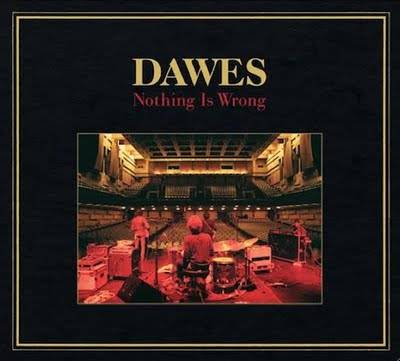 When I saw Dawes on the Middle Brother tour this March it was obvious the band was on the brink of something special. I’ve held their music close to my heart since hearing their debut album, North Hills, not long after it came out. Yet, I never realized what a special connection so many people had with this band until I saw the entire Metro theater in Chicago singing along with “When My Time Comes” at the top of their lungs.
When I saw Dawes on the Middle Brother tour this March it was obvious the band was on the brink of something special. I’ve held their music close to my heart since hearing their debut album, North Hills, not long after it came out. Yet, I never realized what a special connection so many people had with this band until I saw the entire Metro theater in Chicago singing along with “When My Time Comes” at the top of their lungs.
The funny thing about that show, is most of the people in attendance wanted to sing along with all the new songs – though it was likely they (like me) had never heard those songs before.
Dawes’ music is rooted firmly in the Laurel canyon singer-songwriter tradition; they are not redefining any genres, nor are they trying to. Theirs is a brand of folk-rock that relies heavily on excellent instrumentation and smart, earnest songwriting. What they craft, however, is challenging: it asks questions of the listener, it makes you strive to understand it.
Nothing is Wrong, Dawes’ new album, has immediacy to it that warrants multiple, consecutive listens – perhaps for understanding, perhaps for the joy of singing along. The first song, “Time Spent in Los Angeles,” sets the hook: it’s a mid-tempo rocker with swirling organs and wonderfully subtle harmonies sending the chorus to new levels.
The harmonies between lead singer Taylor Goldsmith and his little brother, drummer Griffin, have become the Dawes trademark. Their work is striking and noticeable at first listen and it is often their collaboration that stands out greatest on Nothing is Wrong. When the harmonies subside the elder Goldsmith’s guitar work careens to forefront, displaying chops equal to any great Tom Petty solo. But the beauty in this album is what is always lying beneath the surface.
At first listen the piano or organ (played by Benmont Tench of Tom Petty and the Heartbreakers fame) blend in to the background. But deeper listens uncover the majesty of the C-3 Hammond or the sweeping piano, which ranges from stride to simple percussion with ease.
These elements combine effortlessly to create an album that goes above any beyond their fantastic debut album, North Hills. The most impressive element of Dawes’ music, however, is Taylor Goldsmith’s songwriting. There is an exacting level of care taken by the frontman to create a great song, resulting in honest songs that have appeal their most direct appeal to the twentysomething crow, but reach farther because of their sophisticated construction.
His work on North Hills (intentionally or not) mirrors the subject matter of the Fitzgerald classic “The Great Gatsby.” He confronts the questions of identity and association head-on and the result is strikingly accessible and modern. On Nothing is Wrong his subject matter treads more decisively into Hemingway territory: confronting issues of what it means to be a man and coping with the issues coming of age presents.
His struggles with becoming a man have the same directness Papa Hemingway employed. On “Coming Back To A Man” addresses the issue directly in the title and chorus, but the song “If I Wanted Someone” does a much better song of documenting the struggle. He sings, “If I wanted someone to understand me I’d have so much more to say / I want you to make the days move easy,” and gives the listener a clear insight into how his age has affected his relationships.
His use of the pronoun “man” should not be a turn-off to any potential listeners, though. His writing has a transcendent quality, and on songs like “How Far We’ve Come” and “Million Dollar Bill” the writing expresses emotion anyone can identify with. The apex of the album, undoubtedly, comes on “Fire Away” (featuring background vocals from Jackson Browne, of the Laurel Canyon set); the song reaches epic proportions while confronting what it means to be there for someone you care about.
The album closes with “A Little Bit of Everything,” a slow-moving piano number that reminds me most of “Ashokan Farewell,” the theme from Ken Burns’ The Civil War. But the song hits with the most weight of any song on the album; Goldsmith tells the story of a young man uncertain about his will to keep living, an old man remorseful for past decisions and a young couple enduring the hardship that can occur in the lead-up to their nuptials.
“A Little Bit of Everything” is a little bit of everything that makes Dawes so fantastic. Goldsmith’s words alone have a beautiful poetic grace to them with a directness that could easily be too rough. Yet he speaks softly, and paired with music that is never to gentle or too rough and always matches the intensity of the lyrics, it is exceedingly beautiful.
Nothing is Wrong as a whole, is one of the most fantastic albums I have heard this year. I can’t count how many times I have listened to it now, but it hasn’t lost one bit of it’s appeal.








